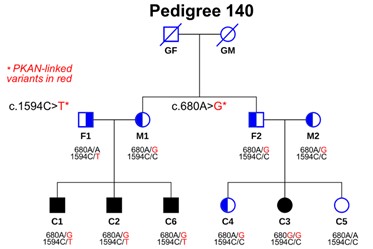Category: Rare Genetic and Metabolic Diseases
Objective: Whole exome sequencing and genotypic screening of homozygous and heterozygous PANK2 mutations in the Dominican Republic.
Background: PKAN affects 1 in 1,000,000 people worldwide, but >1 in 1,000 people in the southwestern DR. More than 50 different mutations in the PANK2 gene are linked to PKAN; the disease has been associated with a single mutation in the DR (a missense c.680A>G change, with a deleterious Tyr227Cys change in PANK2). All subjects reported to date are homozygous. While screening the affected population, we encountered 3 male siblings who were only heterozygous for the c.680A>G mutation, but showed the same clinical features of PKAN. These brothers were born to neurologically normal non-consanguineous parents; only the mother had the c.680A>G mutation.
Method: We performed resequencing of the PANK2 gene, whole exome sequencing of the three probands, their parents, and a set of 2nd degree relatives (aunt, uncle, and 3 first cousins who were neurologically normal carriers, non-carriers, or homozygous for c680A>G mutation). Additional whole exome sequencing data was performed on all extended family members, and failed to reveal any other mutations in PANK2, genes related to NBIA, dystonia, Wilson’s or Parkinson’s disease. Whole exome sequencing in 40 additional PKAN subjects and 45 carriers and non-carriers, as well as genotypic screening by PCR were conducted.
Results: We discovered a highly uncommon 2nd mutation in the 3 affected brothers, inherited from the father (missense c.1594C>T change, leading to a Arg532Trp change) only reported once in the medical literature in a single proband. Genetic analysis failed to reveal a single subject with the c.1594C>T variant outside this family. We compared neurological, neurocognitive, and physiological phenotypes in the 3 brothers and their affected 1st cousin, and the entire cohort of c.680A>G homozygous subjects affected with PKAN in the Dominican Republic.
Conclusion: Overall, the compound heterozygous subjects were older, displayed later disease onset, had more parkinsonian features (increased bradykinesia, rigidity, tremor and elevated UPDRS scores), and had higher body weight, lean body mass and BMR, with lower visceral and fat mass. This is the first known report of homozygous recessive and compound heterozygous mutations found in the same extended PKAN pedigree.
To cite this abstract in AMA style:
F. Middleton, C. Muniz, I. Ojukwu, M. Santana Jimenez, P. Stoeter, R. Ericson, A. Espinoza, C. Bass, P. Roa, S. Baser. Phenotypic analysis of subjects with homozygous and compound heterozygous PANK2 mutations in a single extended pedigree from the Dominican Republic (DR) PKAN cohort [abstract]. Mov Disord. 2020; 35 (suppl 1). https://www.mdsabstracts.org/abstract/phenotypic-analysis-of-subjects-with-homozygous-and-compound-heterozygous-pank2-mutations-in-a-single-extended-pedigree-from-the-dominican-republic-dr-pkan-cohort/. Accessed April 3, 2025.« Back to MDS Virtual Congress 2020
MDS Abstracts - https://www.mdsabstracts.org/abstract/phenotypic-analysis-of-subjects-with-homozygous-and-compound-heterozygous-pank2-mutations-in-a-single-extended-pedigree-from-the-dominican-republic-dr-pkan-cohort/

